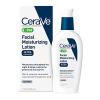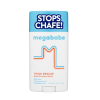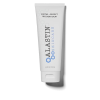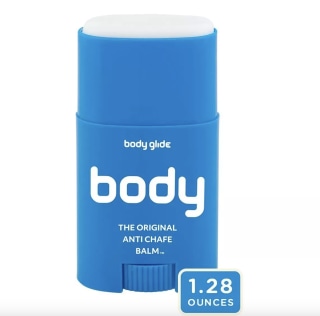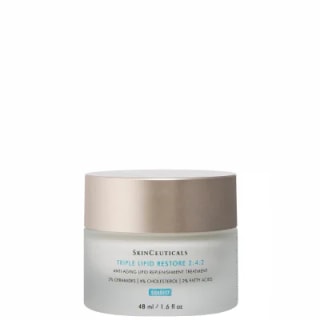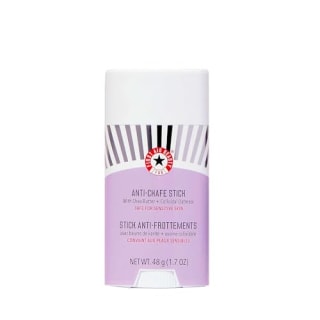Your skin plays host to all sorts of bumps, moles, and textures — but few are as vexing as skin tags, which are growths that arise as little stalks from the skin. They’re the bane of up to 60% of adults, says board-certified dermatologist Dr. Bruce Robinson. And while they’re completely harmless, they can be unsightly or uncomfortable, leading people to seek out skin-tag products.
But while there are plenty of at-home skin-tag treatments on the market, they’re actually not what doctors recommend. Not only are these kits and solutions largely unsafe, but they can actually cause damage to the skin (such as scars) that may look even worse and prove harder to address than a skin tag. In fact, the FDA actually released a warning about the risks of these products due to the risk of injury. Instead, I talked to five dermatologists who shared their recommendations for preventing skin tags, like keeping your skin barrier healthy and reducing friction — after you get any existing ones removed by a professional.
SKIP AHEAD How I picked the best products for skin tags | The best skin tag products in 2025 | How to shop for skin-tag treatments | Frequently asked questions | Why trust NBC Select?
What are skin tags?
Skin tags are little raised bumps that grow from the skin — sort of like a mole, but the same color as your skin. “They are harmless growths,” says Robinson. “Occasionally, when they get far enough off the skin, they have a little stalk.” Because they’re benign, they don’t pose any harm. But some people don’t like how they look.
How I picked the best skin tag prevention products
After talking to dermatologists, I learned that skin tags are hard (if not impossible) to avoid — genetics, hormonal swings and even friction can all play a role in their formation, according to board-certified dermatologist Dr. Arash Akhavan. Since the one area in which we have some control is friction, I looked for two things when curating this list: ingredients that moisturize the skin, keeping the skin-barrier intact and skin itself smooth, thereby reducing friction, as well as formulas that allow skin to glide against itself. With that in mind, I considered:
- Occlusive ingredients: Ingredients that protect the skin barrier, like vitamin E and petrolatum, can help prevent skin tags caused or exacerbated by rubbing.
- Texture: Since skin tags arise in areas where skin naturally folds, like the neck and underarms, it helps for a product to have a smooth but non-greasy feel.
Want more from NBC Select? Sign up for our newsletter, The Selection, and shop smarter.
The best skin tag prevention products in 2025
Megababe Thigh Rescue Anti-Chafe Stick
- Easy to apply
- Mild scent
- Long-lasting
- Feels slightly sticky
A great product for minimizing skin tags is one that relieves friction from skin rubbing together, says board-certified dermatologist Dr. Carmen Castilla. “For example, using glide sticks, like this one, where there is consistent friction [can help],” she says. This anti-chafing stick also gets bonus points for its twist-up applicator and quick application. “It glides on better than any other anti-chafing product I’ve tried, and it’s completely invisible, so it doesn’t transfer onto my clothes,” says NBC Select updates editor Mili Godio.
BodyGlide Original Anti-Chafe Balm
- No residue
- Not sticky
- Fragrance-free
- Doesn't glide as easily
This anti-chafe stick is another good option for alleviating friction; it has vitamin E and is free of petrolatum and mineral oil, which can be irritating to some. “It’s a solid stick that goes on dry, creating a smooth barrier to prevent skin-on-skin rubbing,” says board-certified dermatologist Dr. Noah Gratch. “It doesn’t leave behind a greasy residue or stain fabric, and it goes on clean so you don’t see it on my clothes or body,” says NBC Select reporter Zoe Malin.
Cerave PM Facial Lotion
- Budget-friendly
- Multipurpose
- Suits all skin types
- Small size
Even though this is billed as a night cream, you can use it both day and night and on areas other than the face, says Akhavan, who considers it a good option for keeping skin moisturized. It has ceramides to effectively moisturize the skin (and therefore minimize friction) and niacinamide for its anti-inflammatory properties.
Alastin Skincare Soothe + Protect Recovery Balm
- Suits sensitive skin
- Fragrance-free
- Pricey
Akhavan likes this thicker body moisturizer, since it has petrolatum to serve as a barrier against friction, as well as other ingredients that calm the skin, he says. It was also formulated for use for in-office treatments, according to the brand, so it’s safe for both sensitive skin types and to help moisturize skin following skin-tag removal by a doctor.
Skinceuticals Triple Lipid Restore Moisturizer Cream 2:4:2
- Moisturizing
- Suits sensitive skin
- High price tag
Dermatologists frequently recommend this moisturizer to us — it’s a great barrier cream, not to mention an excellent moisturizer for mature skin. And while the higher price point may mean you don’t slather it everywhere, it could be helpful for spot-treating areas of friction — which is why board-certified dermatologist Dr. Madalyn Nguyen also suggested it for skin tags. In fact, the titular 2:4:2 ratio indicates the proportions of ceramides, cholesterol and fatty acids in the formula, which reflect the ratio naturally found in the skin, according to the brand.
First Aid Beauty Anti-Chafe Stick
- Suits sensitive skin
- Not greasy
- Long-lasting
- Doesn't glide
For another friction-fighting option, Gratch points to this anti-chafe stick. It’s infused with shea butter and colloidal oatmeal to calm irritated skin, since an impaired skin barrier can contribute to skin tags. The alcohol- and fragrance-free formula is also sweat-resistant and won’t leave a visible residue on your clothes, according to the brand.
How to shop for skin tag treatments
We can’t stress this enough: The most important thing to remember when trying to treat a skin tag is that you shouldn’t remove them at home. Skin-tag removal products “generally fall into the category of freezing sprays, acidic solutions that burn the tags off, and bands that cut off blood supply to skin tags,” says Akhavan. “Some of these solutions can effectively remove skin tags, but the risks of use unfortunately outweigh the benefits.” Those include infection, discoloration and scarring.
While it’s not possible to get rid of skin tags on your own, “you can slow their growth by minimizing friction and keeping your skin healthy,” Gratch says. “Since skin tags often develop in areas where skin rubs together, reducing friction is key.” For that purpose, he recommends using chafing sticks and anti-friction balms for that purpose. These often have occlusive ingredients, meaning they create a barrier over your skin, to protect it and help the skin glide against itself.
Another good idea is to keep areas of high friction, such as the neck, underarms and groin, well moisturized, which can also be helpful in minimizing friction, according to Akhavan. “The exact type of moisturizer doesn’t matter so long as it adequately supports and protects the skin barrier,” he says.
Meet our experts
At NBC Select, we work with experts who have specialized knowledge and authority based on relevant training and/or experience. We also take steps to ensure all expert advice and recommendations are made independently and without undisclosed financial conflicts of interest.
- Dr. Arash Akhaven, FAAD, is a board-certified dermatologist and founder of The Dermatology & Laser Group in New York, NY. He’s also a professor at the Mount Sinai Medical Center and specializes in cosmetic procedures as well as treatment of skin cancer, acne and rosacea.
- Dr. Carmen Castilla, FAAD, is a board-certified dermatologist at New York Dermatology Group in New York, NY and clinical instructor at Mount Sinai Hospital. She focuses on both medical and cosmetic dermatology.
- Dr. Bruce Robinson, FAAD, is a board-certified dermatologist in New York, NY. He specializes in difficult-to-diagnose disorders of the skin, hair and nails as well as laser aesthetics and body contouring.
- Dr. Madalyn Nguyen is a board-certified dermatologist at Westlake Dermatology in Austin, TX. She focuses on hair, skin and nails and has a special interest in facial balancing and cosmetic contouring.
- Dr. Noah Gratch, FAAD is a board-certified dermatologist at MDCS Dermatology in New York, NY. He’s also a faculty member at the Cornell University Weill Cornell Medical College and specializes in medical dermatology as well as advanced skin-cancer treatment.
Why trust NBC Select?
I am a freelance beauty writer and editor who’s been covering beauty and health for more than a decade, including topics like at-home microcurrent devices and retinol body lotions. For this article, I spoke to five dermatologists to find the best skin-tag products to shop this year, and highlighted their recommendations for the best options to consider.
Catch up on NBC Select’s in-depth coverage of tech and tools, wellness and more, and follow us on Facebook, Instagram, Twitter and TikTok to stay up to date.

